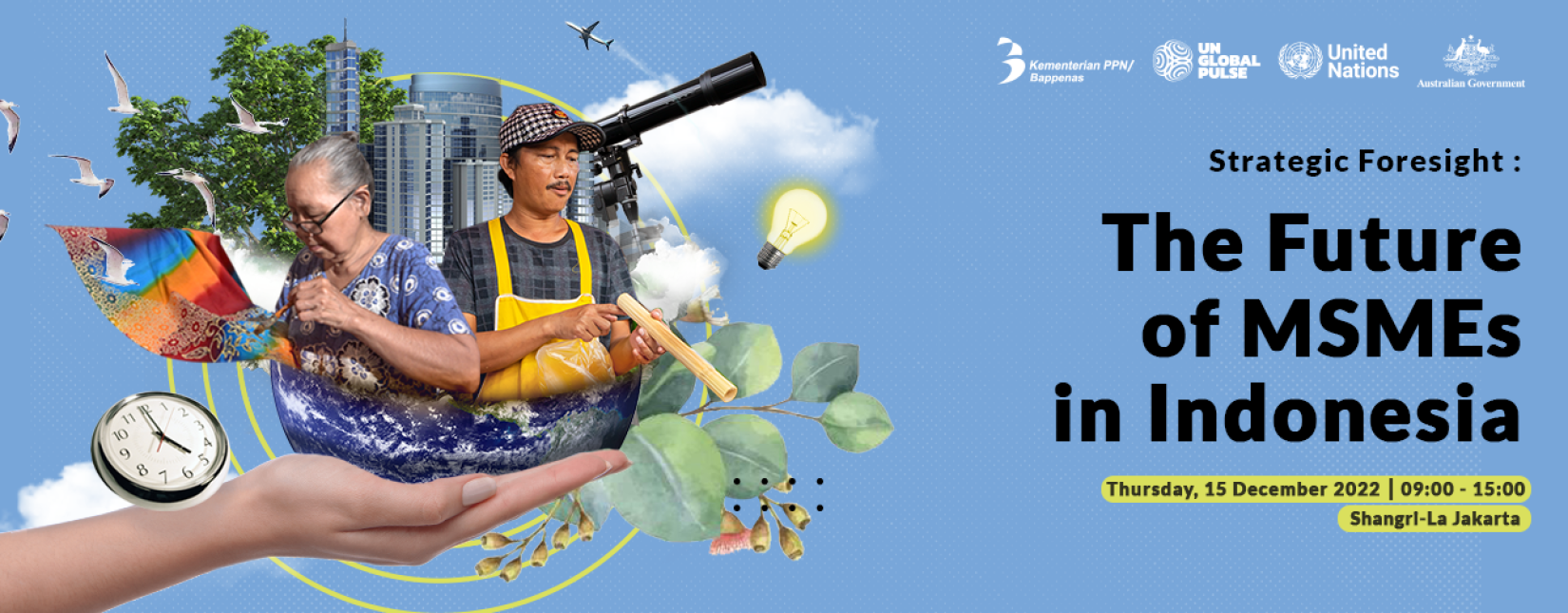Bappenas and UN Global Pulse Launch the “Strategic Foresight: The Futures of MSMEs in Indonesia” Joint Report
15 December 2022
---

15 December 2022, Jakarta — Today, the Indonesian Ministry of National Development Planning (Bappenas) and United Nations Global Pulse (UNGP) hosted the “Strategic Foresight: The Futures of MSMEs in Indonesia” joint report launch in Jakarta. The report, which can be read here, presents the results of the horizon scanning activity conducted to identify potential emerging issues that can affect Indonesian MSMEs 10-20 years in the future.
MSMEs provide employment for 97% of Indonesia's total workforce or around 117 million workers, 64.5% of which are women. This sector is crucial and often considered the backbone of the Indonesian economy, however, as the recent pandemic and global crises has proven, they are particularly vulnerable to negative shocks. In times of high uncertainty and amidst rapid changes, it is vital to prepare for the unexpected, particularly as it relates to MSMEs.
In view of this, Bappenas and UNGP through Pulse Lab Jakarta (PLJ) and Pulse Lab Finland (PLF) collaborated to use the Strategic Foresight method to help anticipate what lies ahead. The foresight method is useful for thinking and acting in a long-term and anticipatory way, which is helpful for ensuring that likely scenarios and assumptions are integrated into policymaking. By utilizing the horizon scanning technique as one of the main foresight tools, several questions were addressed, namely what are the key emerging issues for the sector and what could potentially alter and disrupt the future of MSMEs as we currently envision it. Following a rigorous process, five drivers were identified: climate change, increasing sustainable economic partnerships, the rise of emerging sectors and change in consumer preferences, technology as a new way of working, and precarious work in the gig economy.
This event seeks to build a collective understanding of the importance of anticipatory and forward thinking approaches in policy planning. In his keynote speech, the Executive Secretary of National Development Planning, Mr. Taufik Hanafi, speaks of the importance of looking forward and strengthening MSMEs, “The business world, particularly MSMEs, are affected by a broad range of changes from production to marketing. We should see these changes as an opportunity for MSMEs to adapt their business processes by utilizing digital technology and undertaking various innovations. For this reason, we must have the ability to look forward, be visionary, and develop strategies that enable MSMEs to be more resilient and adaptive.”
UN Resident Coordinator in Indonesia, Ms. Valerie Julliand, also emphasized the importance of strategic foresight by stating that, “for policies to be effective […] they need to be rooted in the particular context in which they will be implemented. Strategic foresights are helpful in this regard as it enables anticipatory action and the design of more forward-looking policies.The UN will continue to support the Indonesian government in adapting innovative methods and to ensure that these methods are put to good use for the country and its people.”
With the launch of this report, Bappenas and UNGP invite various stakeholders to discuss the broader ecosystemic drivers that could potentially shape the futures of MSMEs in Indonesia, and to build a common understanding of how using foresight can support and strengthen policy planning moving forward.
For more information regarding our report please visit https://pulselabjakarta.org/ourwork/foresight or contact plj@un.or.id.
***
About Pulse Lab Jakarta
Pulse Lab Jakarta is a joint data innovation facility of the United Nations (Global Pulse) and the Government of Indonesia (via the Ministry of National Development Planning, Bappenas). Functioning as an analytic partnerships accelerator, the Lab applies mixed-methods approaches in the problem, solution and identity spaces, and is focused on catalyzing connections across the private sector, government and civil society to support policies and action for effective development and humanitarian practice.




